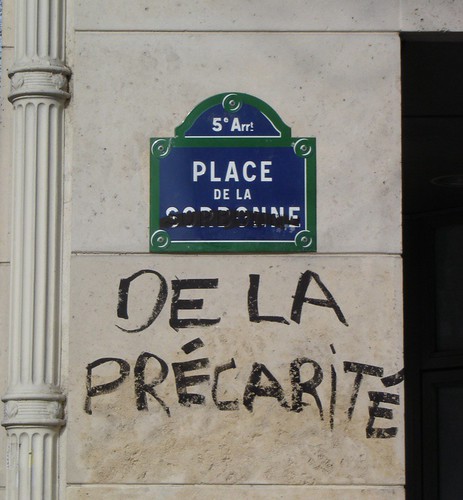
The case for Segolene Royal... (21rst April 2007)
Though I may not have the right to vote in this upcoming election, I have through much deliberation come to the conclusion that France should vote Segolene Royal this Sunday and in the second round. I have come to this conclusion for three main reasons: firstly, her consistent programme, her accessibility,and thirdly, she is the only one capable of beating Sarkozy.
Throughout her whole campaign she has retained a consistent line in her programme, though sometimes tinted by odd populism (which is inherent to being a politician) such as all the french should learn la Marseillaise and brandishing French flags. She is not however prone to outbursts of machoism and one-upmanship which characterises the election trails of karcher brandishing Sarkozy or the "virile" Bayrou. She has kept a strong modern socialist programme which is much more palatable then the vacuum of Bayrou (who doesn't know his right from his left) or the liberal-dirigiste-multiculturaliste-nationaliste muddled promises of the candidat UMP.
She may not be a fantastic orateur but one thing she does have is an interaction with the people which Sarkozy (who hasn't stepped anywhere remotely banlieux since the riots) or Bayrou could only dream of... To put it simply she hasn't cut herself off from a whole part of the French population. She has the capacity to debate with people which is at once refreshing and bold since her programme is a systhesis of the wishes of the french people (from all backgrounds and origines). She has been criticized many a time for a lack of consistency but in the last month she has turned up trumps proposing a very concrete programme and a vision of France which is at once forward looking and pragmatic. She hasn't got the arrogance of Bayroux or Sarkozy who assume that their ideas are the ones the french need, she has made herself open to debate and rid herself of the shackles of the French socialist party ideology, while allying herself with intelligent and strong men of the left such a Strauss-Kahn. People say she hasn't revolutionised the Socialist party into a "nouveau party socialist" but as I said before she is not constrained by the party and to add to it, the French left once in power seem to be a lot more pragmatic then the right.
Finally France needs Segolene Royal because Sarkozy is dangerous and she is the only one who can beat him. Anti-Sarkozysme has become a past time in France for a whole part of the population, no other man in French history has been so popular and yet so loathed. He has many assets, but his authoritarian nature ("misnistre de l'identite nationale et de l'immigration" for one) and lack of communication beyond police shields and angry words to a whole half of the french population, makes the prospect of a Sarkozy presidency unthinkable. A president should be capable of communicating to the whole French people, he doesn't have that capacity nor does he wish to. She has the depth and strength to beat him, unlike Bayrou who is as Le Pen so correctly put it a "bulle sondagiere".
She has many faults and she is in no means representative of all my beliefs but she appears to be the best and the only one who won't sink France lower then it has already sunk, and who offers a real alternative to Gaullism which has cursed France since the great man was president himself.In conclusion France needs her.
The end of one man's dream and a nation's nightmare? (26th of April 2007)
From the day the results were shown everybody said Sarkozy will win hands down. With a historically high score nothing seems capable to stop this man from holding the keys to the coveted Elysee Palace. Segolene Royal, though she herself receiving a high score in the first round, has been told many a time that she will not be able to "rassemble" around her a sufficient amount of people to beat Sarko on the 7th of May. With an electoral base of around 40% the left in France has never had a tougher challenge. All the sondages gave Sarkozy a hands down victory against Royal ranging between 55-45 or 53-47 in favour of Sarko.
Things now however do not seem so sure with the results of a recent poll showing the gap between the two becoming smaller (49-51 in favour of Sarkozy). This slide coming from the sudden surge in optimism of a reinvigorated left throwing away the dark shadow of 2002 and combating more fervently against the negative and populist election slogans of a politically muddled Sarkozy, who finds it normal to quote Jaures and Blum in his speeches, when he knows nothing of the words compassion, humanity and dialogue.
Madame Royal is also gaining ground on the electorate of M. Bayrou. Unlike Sarkozy, she is perceived as a more centrist candidate. To add to this the manner in which she wishes to woo the UDF electorate is one of discussion and debate, unlike M.Sarkozy's threats and masochist flexing of political muscle, which shows clearly the different ways in which the Presidential hopefuls wish to govern France in the future. One can therefore understand why the Bayrou electorate is expected to vote in favour of Royal.
The election day is looming closer and closer, France will have to make a choice between two visions of the future. One in which intolerance, violence, "false promises" and "deception" (as Sarkozy said himself about the post election period), reign or one in which compromise, dialogue and hope will be King (pun not intended). The choice is clear.



